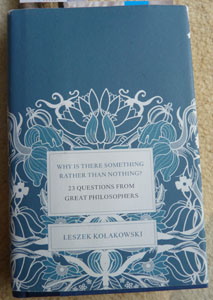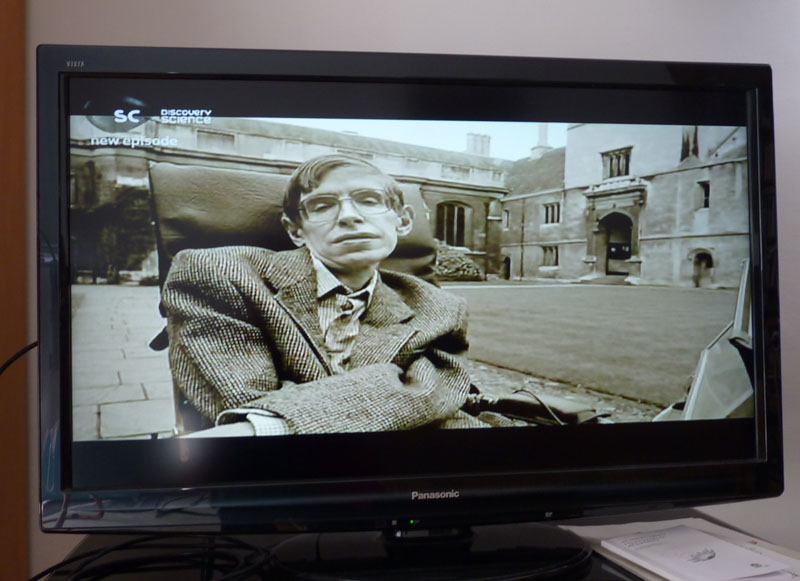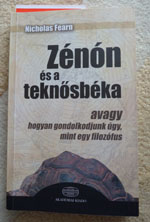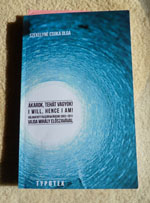On the mathematics of the quantum theory I.
First approach
Generally, neither mathematicians, nor physicists like it when somebody talks about the philosophical interpretation of mathematical models. One of the reasons for this is that many people try to speak about fields of physics interesting in a philosophical sense without the knowledge of the mathematical language, using merely verbality, for example about the relativity theory, or about quantum physics. This is apparently an impossible undertaking since mathematical models are born just because for explaining of some phenomena, verbal description alone is not sufficient.
I also drew a long bow when I wrote that the relation of space and time is similar to the mathematical relation of finite and infinite in a special sense. I had to add the expression to him ‘in a special sense’, narrowing the general sense of the statement by this, since we have already modelled the relation of finite and infinite in many different ways by now. The statement makes only sense if we know the underlying mathematical model.
Maybe, I will exaggerate now with my ideas related to quantum physics, but I am unable to resist the temptation to write about it because the thoughts are so interesting.
After registration, you may ask for a translation of the full text by email.
On happiness
 Not only the New Year, but the Christmas holidays are suitable for self-assessment as well. In this case, however, our emotional life is much more assessed. At Christmas our thoughts go around love and happiness. There is a close connection between these two concepts, but should not be confused them. Happiness comes from love mostly, but reason of unhappiness may be a lot of other things. So, it is not good to derive the reason of human happiness from love exclusively, because this leads to a wrong way, people consider the deficiency of happiness to be the deficiency of love mistakenly. The main difference between them is that while the love has an object, the happiness represents a special state in which we feel well.
Not only the New Year, but the Christmas holidays are suitable for self-assessment as well. In this case, however, our emotional life is much more assessed. At Christmas our thoughts go around love and happiness. There is a close connection between these two concepts, but should not be confused them. Happiness comes from love mostly, but reason of unhappiness may be a lot of other things. So, it is not good to derive the reason of human happiness from love exclusively, because this leads to a wrong way, people consider the deficiency of happiness to be the deficiency of love mistakenly. The main difference between them is that while the love has an object, the happiness represents a special state in which we feel well.
After registration, you may ask for a translation of the full text by email.
Book review
Leszek Kołakowski, What kind of questions the great philosophers address to us
At long last! Years ago I had read English translation1 of these lectures, and I loved it. More precisely as Kołakowski wrote in the note on the English edition: „In the original Polish edition there are thirty essays. But publishers are cruel beasts, and they demanded a selection. The philosophers left out of this edition, for one reason or another (but through no fault of their own), are: Aristotle, Meister Eckhart, Nicolas of Cusa, Hobbes, Heidegger, Jaspers and Plotinus.”

Hungarian translation was made of the full Polish edition. I was very curious why had Aristotle and Heidegger left out of English translation.
_____________________________________
1 Leszek Kołakowski, Why is there something rather than nothing? – 23 questions from great philosophers
After registration, you may ask for a translation of the full text by email.
Error in the logic of the faiths about the old golden age
Recurrent thoughts in cultural history are the belief that there was a golden age1 long ago, and since then humanity has been in decline. The saying about "good old days" is similar to phrase of golden age.
In the idea of golden age I feel the same logic error that the "time-arrow" interpretation causes in physics. In physics the entropy law describes closed systems and this systems move toward simplification and symmetries. This law is on a par with thought of time-arrow. I wrote about this in an article2 hence I do not want to outtalk. Golden age was not in past but it will be in future. In the same way the Universe is not under physical entropy law, because it is not closed system. Direction of changes point to emergence of more complex3 systems.
_____________________________________
1 The term Golden Age (Χρυσόν Γένος) comes from Greek mythology, but there are similar ideas in Egyptian legend, and in the Bible as Eden.
2 http://english.infinitemath.hu/index.php/others/item/14-on-the-evolutionary-changes-and-their-mathematical-interpretations.html
3 There is picture of universe in a very large scale which shows our universe with fibrous structure of the galaxies. This picture definitively proves global increase of complexity to me.
After registration, you may ask for a translation of the full text by email.
Stephen Hawking, when he does not talk about physics
 In 2010 I saw a show with Stephen Hawking who talked about the possibility of extraterrestrial life. This week I saw another show in the Discovery Science Channel, Hawking presented his opinion about the question: Is there a meaning to our lives.
In 2010 I saw a show with Stephen Hawking who talked about the possibility of extraterrestrial life. This week I saw another show in the Discovery Science Channel, Hawking presented his opinion about the question: Is there a meaning to our lives.
In the current show Hawking declares: "the philosophy is dead." I disagree with this statement and unfortunately, both films disappointed me; Hawking's opinion is commonly trivial or arguable according to me.
In my opinion the real philosophy is equivalent to a scientific world view. This view is scientific in the sense that its methodology is scientific, and it incorporates all important human knowledge. The philosophy as world view dynamically synthesizes the achievements of all sciences.

Two philosophical books – review
 Nicholas Fearn, Zeno and the tortoise – How to think like a philosopher1
Nicholas Fearn, Zeno and the tortoise – How to think like a philosopher1
János Tőzsér, Metaphysics2
I do not wish to recommend nobody the above two books, on the contrary; I would like to spare the reader from a disappointment.
Nicholas Fearn, Zeno and the tortoise – How to think like a philosopher
The book's author wishes to present the philosophers' methods in popularising style. The writer tries to keep his reader's interest with gossips about the philosophers' life, and to demonstrate the philosophical methods with examples which are the possible plainest and often misleading illustrations. Thus the author reveals his opinion about the book-learning and mental efficiencies of his readers. In addition, the content of the book is not much more which can be found with a quick search on the Internet.
___________________________________________________________
1http://www.amazon.com/Zeno-Tortoise-Think-Like-Philosopher/dp/0802139175
2http://akkrt.hu/1192/e_konyv/filozofia_es_logika/metafizika_ebook
After registration, you may ask for a translation of the full text by email.
Olga Szekelyne Csuka, I will, hence I am!

(Review)
Typotex Kiadó published an interesting book1; philosophical essays of Olga Szekelyne Csuka in Hungarian and in English in a volume. Mihaly Vajda wrote a foreword to the book, and the author's husband, Zoltan Szekely wrote the blurb. I have deemed the latter two writings as odd recommendation, because both had one or two sentences, which is discouraging for an average reader to peruse this book. Mihaly Vajda – albeit in a quotation mark – qualified the writings as “unscientific” but true essays. In addition Zoltan Szekely's vague reference to the schizophrenia is not very enticing for a prospective reader.
I would now sketch my thoughts connected with the first essay only. The book's title was inspired by this essay, "Rethinking Descartes’ Philosophy (Polemics with Heidegger)." Already it is also interesting for me that Descartes' famous "I think, hence I am" principle first takes other forms: "I doubt, hence I am", "I existed, since I was persuaded", "I exist, since I am deceived". Original meaning of "I think, hence I am" principle is "I doubt, hence I am" in Olga Szekelyne Csuka's opinion. This is very interesting for me in many ways.
_______________________________________________________________
1 http://www.typotex.hu/konyv/szekelyne_csuka_olga_akarok_tehat_vagyok
After registration, you may ask for a translation of the full text by email.
Faith and Doubt
The doubt does not contradict the faith, but they go together. As soon as it is not necessary to prove the models of new reality in the science, but it is needed to deal with the refutability1 of models, likewise the religious faiths and the notions of future of our everyday life are under continuous control and under feedback.
What we know, we do not know a hundred-percent certainty, let alone our faith is only an open potentiality. In addition, the faith is vitiated by the self-interest and the knowledge is also polluted with it.
The doubt is based on the knowledge, that our knowledge is finite, and partial, so the resulting belief system is even more restricted. No matter how it sounds paradoxical, not the scepticism, but lack of the doubt means the ignorance.
______________________________________
1See Karl Popper's theory of potential falsifiability as the criterion demarcating science from non-science.
After registration, you may ask for a translation of the full text by email.
The scientist as mass-man
Thoughts in connection with the writings of four authors: José Ortega y Gasset, Róbert Schiller, Ágnes Kapitány and Gábor Kapitány1
The emergence of the intellectual mode of production makes one of the chapters of Ortega’s essay timely. This essay is The Revolt of the Masses and the above chapter is the chapter XII The barbarism of “specialisation”. For some time past I have been planning to write about this Ortega’s essay from my own point of view but now I only comment on a part concerning the scholars.
Content
1. The mass-man of Ortega
2. The scientist as mass-man
3. Wide-angle view point
4. Evolution of the science
______________________________________________
1 Quoted works:
José Ortega y Gasset, The Revolt of the Masses
Róbert Schiller, Why is Ortega angry with the scholars?
Ágnes Kapitány – Gábor Kapitány, Intellectual mode of production
After registration, you may ask for a translation of the full text by email.
About freedom and free will
I have kept putting off writing about this subject. One reason for the delay is that this subject is one of the most controversial issues of philosophy, and the question is still open. The other reason is that this is one of my favorite subjects, which I could chatter about too much, and I want to avoid this. With a heavy heart but for the sake of brevity, I am not going to quote the relevant works of my favorite writers a lot, I'm not going to outline the extensive literature on this subject, and I will not even list the most heterogeneous opinions belonging to this problem. I will solely summarize my own view on this object.
I do not deal with the legal, social aspects of freedom, i.e. how much freedom societies give their members or withhold from them. This is an interesting and very current topic, and I will write about this in another article. Based on my own opinion, I solely want to elucidate the philosophical concept of freedom. In this sense, the notion of freedom and free will is closely connected to the concept of the determinism.
1. External and internal freedom
I distinguish external freedom from internal freedom in the sense that we may make a choice between different actions or only between the different manners of actions. Using Epictetus’1 "dramatic" metaphor, external freedom is the possibility of choice when I can also define the "scenario" of the action, and internal freedom is when as an actor I can only choose the manner of the drama.
__________________________
1 Epictetus believed only in the internal freedom: “Remember that you are an actor in a drama, of such a kind as the author pleases to make it. If short, of a short one; if long, of a long one. If it is his pleasure you should act a poor man, a cripple, a governor, or a private person, see that you act it naturally. For this is your business, to act well the character assigned you; to choose it is another's.” (Epictetus, The Enchiridion/17)
After registration, you may ask for a translation of the full text by email.



